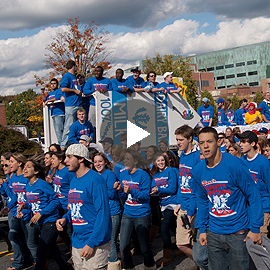By Allison McLellan, originally published on the Materials Science and Engineering Department
 MSE postdoctorate Lydie Louis does not allow the summer break to stop her intellectual endeavors. This August, she participated in the Paris International School, France, on Advanced Computational Materials Science (PISACMS), where she received the PISACMS 2015 Best Poster Prize for the “Structural and Dielectric Properties of the Ruddlesden-Popper Ba2ZrO4 Structure from First-Principles” presentation. This project—recently published in Physical Review B—reported on the computational design and characterization of a layered-oxide material exhibiting unusual dielectric properties.
MSE postdoctorate Lydie Louis does not allow the summer break to stop her intellectual endeavors. This August, she participated in the Paris International School, France, on Advanced Computational Materials Science (PISACMS), where she received the PISACMS 2015 Best Poster Prize for the “Structural and Dielectric Properties of the Ruddlesden-Popper Ba2ZrO4 Structure from First-Principles” presentation. This project—recently published in Physical Review B—reported on the computational design and characterization of a layered-oxide material exhibiting unusual dielectric properties.
From August 24th to the 28th, the summer school was held at Campus Jussieu with support from Labex Matisse and Sorbonne Universités. The main goal of PISACMS is to educate young researchers on atomic, molecular, and condensed phase computational methods, ranging from basic theory to the most advanced approaches, and from microscopic to macroscopic length scales. This includes techniques such as Density Functional Theory, classical Monte-Carlo and molecular dynamics, ab initio molecular dynamics, metadynamics, linear response, lattice-Boltzmann methods, and Quantum Monte-Carlo. Due to the expanse of approaches covered, encompassing lessons in theory as well as computer lab projects, the school’s curriculum is rare on a global landscape.
Lydie’s advisor, Associate Professor Serge Nakhmanson, leads the ‘Complex Materials by Computational Design’ group of the Department of Materials Science and Engineering and the Institute of Materials Science. The group is heavily engaged in developing how new materials with advanced functional properties can be created through high-performance computer simulations. Having officially joined UConn in January 2013, the professor’s research interests include designing novel multifunctional ferroics with quantum-mechanical calculations and mesoscale simulations of electroactive materials and nanostructures, both “hard,” such as oxide ceramics, and “soft,” such as polymers, oligomers, molecular crystals and cocrystals.
In the years of working along side Dr. Nakhmanson, Lydie has also studied a wide range of functional systems, including layered oxides present in the PISACMS poster, ferroelectric polymers, and molecular crystals. Currently, she is spearheading a new project funded by Pfizer Inc. on predicting molecular cocrystal crystallizability with the help of data mining techniques. She is consistently a vital contributor towards advancing projects as well as providing strong insight into the behavior of the systems being studied.
From his experience with her in the lab, Dr. Nakhmanson says, “Lydie is definitely the ‘glue’ that holds our group together. Our graduate and undergraduate students frequently consult her on a variety of different issues (both scientific and technical) and always get excellent advice. Essentially, she looks after every member of the group, including the new graduate student who has not even arrived yet. Thus, I am very impressed with her mentoring and personal communication skills that are essential for ensuring a friendly and collaborative atmosphere for everyone within the group.”
Besides her international conference travel, Lydie has also published a paper earlier this month in the esteemed scientific journal, Nature Communications, in collaboration with her Ph.D. advisor. Entitled “Discovery of Stable Skyrmionic State in Ferroelectric Nanocomposites,” the article demonstrates, via the use of a first-principles-based framework, that skyrmionic (or vortex-like) configuration of polar dipoles can be stabilized in ferroelectric nanocomposites, which may lead to a number of interesting applications of such polarization-closure patterns in future technology.
But Lydie is not done traveling yet. She has been invited to join other speakers from across the world at the “Energy, Materials, Nanotechnology” (EMN) Fall meeting being held in Las Vegas, Nevada this November. This event is held in order to provide a platform for leading scientists, researchers, scholars, and engineers from global academia, R&D laboratories, and industries to share and learn the most recent advancements in nanotechnology and energy-related materials and technologies. Lydie will be speaking on the “Unusual ferroic functionalities in complex-oxide multilayers by design.”



